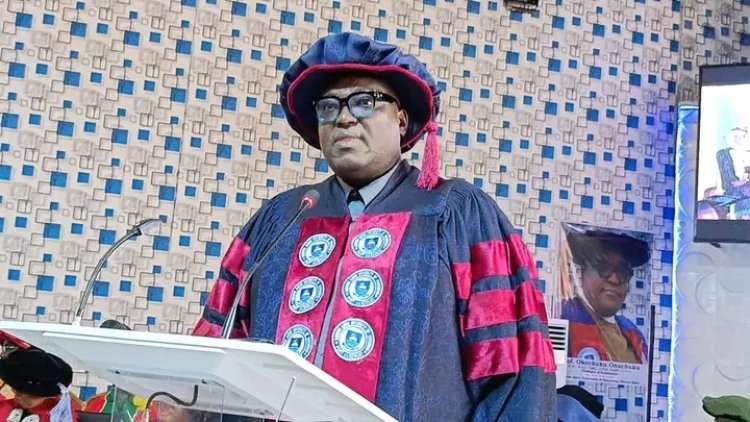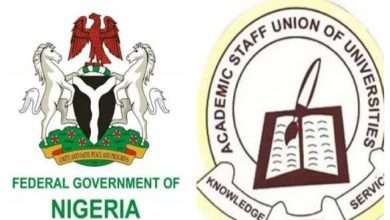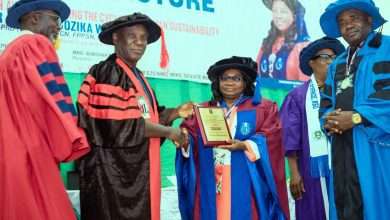
By Tunde Uchegbuo
The relationship between a university and its host community is symbiotic. The university benefits from the conducive environment the community creates to conduct its activities, while the university contributes to the economic and social development of the community. It is the practice everywhere. However, these expectations fall short sometimes, resulting to crisis.
On Monday May 19, 2025, the gates of Ignatius Ajuru University of Education, were shut to academic and administrative activities by some indigenes of Rumuolumeni, one of the university’s host communities. The protesters said the action was to express their discontent over claimed non-employment of their sons and daughters in the recently concluded recruitment of teaching and non-teaching staff in the university.
A youth leader from the community, Felix Chinda, alleged that they were shortchanged in the process, and accused the vice-chancellor of the university, Professor Okechuku Onuchuku, of allocating job opportunities to his associates and refused to convert community members who had served as casual staff for 15 years and above.
Reacting to the allegations, the vice-chancellor, Professor Okechuku Onuchuku, clarified that he did not superintend over the recruitment and could not have allotted more employment slots to his associates. He explained that the exercise was fully supervised by the university governing council, insisting that the exercise followed due process. Speaking on non-conversion of some indigenes of the community who had served over 15 years as casual staff, the vice-chancellor disclosed that most of those involved were above the 50-year age limit for first employment as stipulated in the state civil service rule, while some were converted within the capacity of approved slots.
Prof. Onuchuku maintained that Rumuolumeni had a fair share in the recruitment. He explained that out of the 1,500 vacancies approved by the Rivers State government, 1,100 positions were for academics, while 400 were for the non-teaching category. He clarified that if the positions were distributed equally among the 23 local government areas in the state, each LGA would have 47 slots for teaching and 17 for non- teaching. The vice-chancellor revealed that Rumuolumeni, which is one ward in Obio/Akpor local government area of the state, got 15 positions in the academic category and 30 in the non-teaching cadre, making it 45 positions.
He insisted that the university is a public educational institution owned by the Rivers State Government, and its hiring process cannot be likened to oil company or a private enterprise. Prof. Onuchuku maintained that recruitment in the university system is usually competitive, particularly for the teaching category and other senior non-teaching specialized personnel such as medical doctors, accountants, laboratory scientists, engineers, etc.
Meanwhile, after a meeting between the university management and the paramount ruler of Rumuolumeni, His Royal Highness, Eze Chukwuemeka Victor Woji Okocha Olumeni and his council, the monarch stated that the palace did not give any directive to any group or groups of people to protest. The statement from the palace affirms the vice-chancellor’s assertion that the protest was sponsored by some influential members of the community whose candidates were not selected because they did not score the required benchmark in the recruitment process.
So, while acknowledging that the concerns of host communities about employment opportunities are legitimate and valid, it is important to mention that the most challenge tertiary educational institutions face during recruitment exercises is meeting the employment expectations of their host communities’ insatiable demand for more positions even though it means violating acceptable guidelines, and despite the number of positions available. In fact, the recruitment of teaching staff in universities around the globe is usually guided by merit, transparency, and fairness, and these values were followed by the university in ensuring that the best candidates were selected for the available positions, regardless of their background or community of origin.
More so, if the demands of the host communities were granted, the 1,500 positions would have gone to them alone due to the plethora of demands from different groups. It is in line with keeping to the global best practices in hiring the academia and to ensure that the university host communities are not left out in activities of the university that Ignatius Ajuru University of Education established programmes and initiatives aimed at promoting the development of its host communities through the award of scholarships, community service, as well as strict adherence to the employment of junior workers. Therefore, as a responsive corporate institution, the management takes the recent picketing of the institution by some indigenes of Rumuolumeni as one of the rifts that occasionally manifest between an institution and its stakeholders, and will not change the university’s commitment to the needs of its host communities, just as the management will not lose sight of the peculiarities of a university as a citadel of learning while hiring of its workforce.






